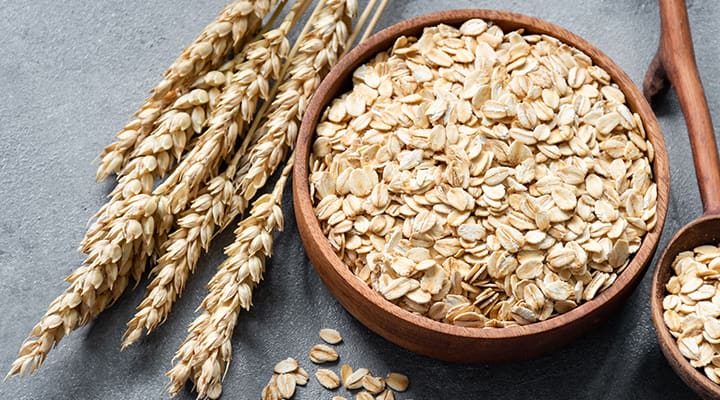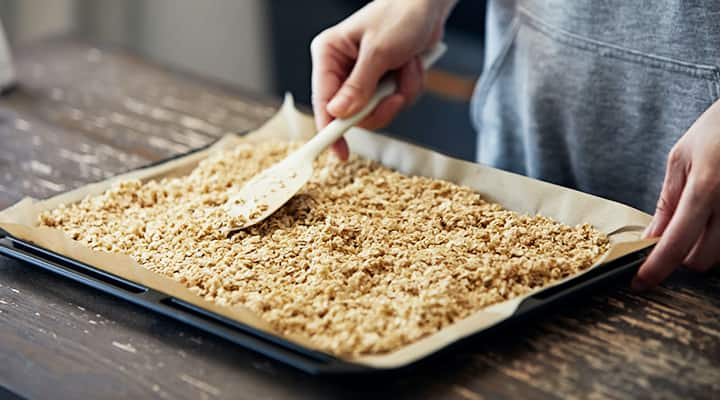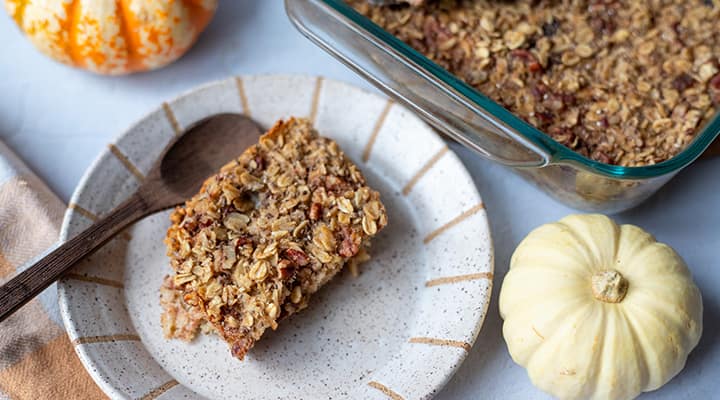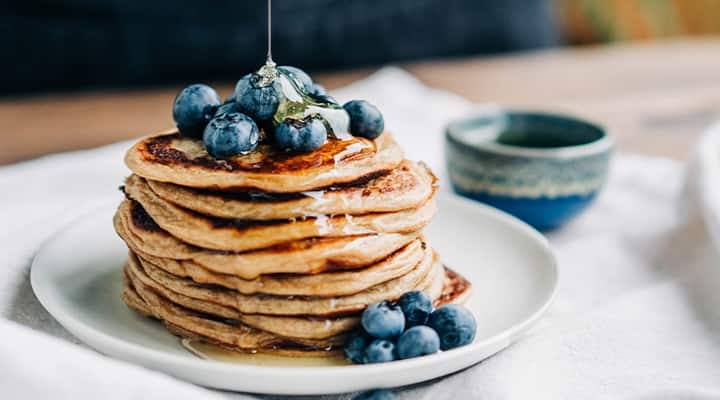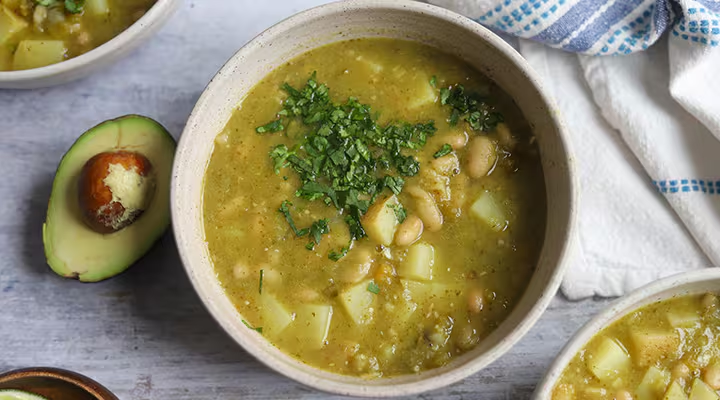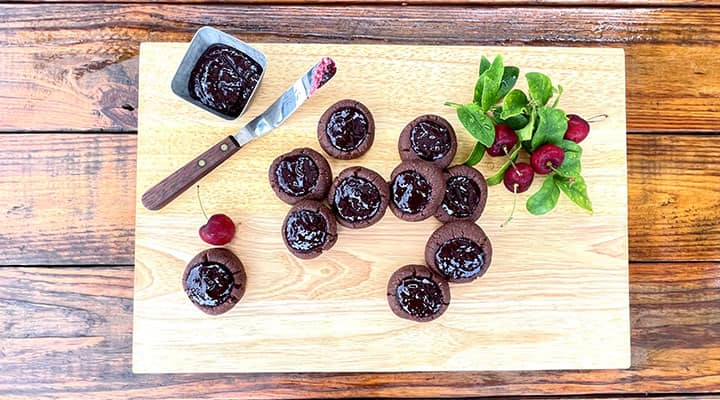
Baked Oatmeal: A Hearty, High-Protein Recipe
Published: December 2022
Warm oatmeal is a classic breakfast, especially with brown sugar or maple syrup and other add-ins. But a bowl of soft rolled oats, which have either been cooked on a stove or soaked overnight, isn't the only way to enjoy the taste and nutrients of oatmeal. This baked oatmeal recipe is a great way to enjoy oatmeal’s immune-supporting nutrients, protein and fiber in a grab-and-go form.
What is baked oatmeal?
If you haven’t tried healthy baked oatmeal, you are in for a treat. This baked oatmeal recipe is not your typical breakfast porridge. It is much firmer in texture and sweeter, like eating a dessert (especially if you include chocolate chips in your oatmeal recipe) but without tons of sugar. Baked oatmeal is made by mixing together your favorite ingredients and then spreading the oat mixture in a baking dish. You then bake it in the oven until it is firm, with the consistency of cake or quick bread.
It’s super easy to make and extremely convenient for an egg-free breakfast on the go. After baking, this tasty breakfast can be conveniently cut in squares (or you can prepare baked oatmeal cups in a muffin pan) for an easy handheld treat resembling an extra-nutritious moist dessert.
Is baked oatmeal good for you?
Depending on the add-ins, this baked oatmeal recipe can be very nutritious. Oatmeal is a wonderful health food, and oats are among the most nutrient-dense whole grains. They are packed with protein and full of vitamins, minerals, fiber and healthy carbs. With the nuts in this recipe, this oatmeal (served with a side of Greek yogurt) would be a great food to break a fast. After all, oats help promote healthy weight management, and they support heart health and already-healthy cholesterol levels. Oatmeal recipes are usually good for your wallet, as well. Pro tip: Be careful not to add too much brown sugar or maple syrup—the light sweetness of this recipe is enough.
Are oats good for immune health?
In addition to their cardiovascular benefits, oats are rich in nutrients that support a healthy immune system, including:
- Selenium. Intake of this mineral may promote immune system function. Selenium is also an important trace mineral for thyroid health.
- Zinc. Zinc is well-known for its immune health benefits, and also happens to be a part of one of your body’s most powerful natural antioxidants.
- Copper. Copper is needed for normal immune function and synthesis of certain proteins.
- Iron. Iron helps encourage oxygen delivery to cells, which in turn supports body energy and immune health.
- Beta glucans. A non-digestible fiber, beta glucans are immune response activators that help the immune system to react quickly and efficiently to every day and seasonal immune challenges.
The antioxidants and fiber in oats also support already-healthy blood sugar levels, already-healthy blood pressure and healthy digestion.
Can you make baked oats ahead of time?
Baked oatmeal is a wonderful recipe for meal prep. If you make a pan of baked oatmeal in the beginning of the week and cut it into squares (or oatmeal cups), this baked oatmeal recipe could serve several days' worth of breakfast or afternoon snacks. The quality of this oatmeal dish does not diminish when prepared ahead of time. Reheating is easy: Just heat the square of baked oatmeal or the baked oatmeal cup in the microwave for 30 seconds to a minute. You will find that baked oatmeal is an amazingly convenient and delicious option for your busy mornings. This recipe also freezes well in individual portions.
Is baked oatmeal mushy?
Baked oatmeal is not chewy like the steel cut oats you cook on the stovetop into a porridge. In terms of consistency, baked oats more closely resemble a blondie or brownie with a cake-like texture. The oatmeal, when baked, becomes firm and is easily cut in squares, so no spoon is needed! If baked past the recommended time, the oatmeal will become even firmer and slightly more breakfast bar-like in texture. If you find oatmeal's sogginess unappetizing, this baked version of oatmeal will be much more appealing.
What oats are best for baked oats?
The best oats to bake are old-fashioned rolled oats. These work much better than steel cut oats or quick oats. I like to use gluten-free oats, but that is not necessary. Just be sure to use whole grain oats. These have the best texture and the best nutritional profile.
What to serve with baked oatmeal?
I like to serve my baked oatmeal with a drizzle of pure maple syrup or almond butter, sometimes with a glass of almond milk. Another great addition to baked oats is a side of Greek yogurt and fresh fruit. Usually when I eat baked oatmeal, it is because I want a quick and convenient dairy-free breakfast. I just grab a square, wrap it in a napkin and munch on it as-is while I am driving.
Explore Our Best Immune Support Supplements
How to make healthy baked oatmeal
Making healthy baked oats is very easy. It is as simple as mixing together the dry ingredients and the wet ingredients in an oven-safe baking dish and baking them in the oven. You only need to dirty one dish in the preparation if you prefer, or you can mix your wet ingredients and dry ingredients separately in a large bowl before spreading them in your baking dish.
Ingredients
Makes 6 portions
2 cups gluten-free old fashioned rolled oats
1 15-oz can light unsweetened coconut milk
1/2 cup unsweetened applesauce
4 tbsp pure maple syrup
2 tbsp raisins
2 tbsp chia seeds
1 tsp pure vanilla extract
1 tsp ground cinnamon
1/3 tsp salt
1/2 cup pecan halves and pieces
Step-by-step preparation
- Preheat oven to 350 degrees.
- In a square baking dish, combine the oats, raisins, chia seeds, cinnamon, salt and pecans. Add the coconut milk, applesauce, maple syrup and vanilla extract. Mix well and spread evenly in the baking pan.
- Bake uncovered for a total time of 40 minutes
- Let cool for 15 minutes and cut into 6 rectangles
- Cool completely before packing into an airtight container for the refrigerator or freezer.
Nutritional values per serving
Calories: 253
Carbohydrates: 37 g
Protein: 5 g
Fat: 10 g
Sodium: 135 mg
Fiber: 6 g
Sugar: 11 g
All nutritional information is based on third-party calculations and is only an estimate. Each recipe and nutritional value will vary depending on the brands you use, measuring methods and portion sizes.
Tips for success
The beauty of this baked oatmeal recipe is that it can include whatever mix-ins you wish. The options are as varied as your pantry!
- Almond milk or oat milk could be used in place of coconut milk.
- Brown sugar could be swapped for the maple syrup.
- Almond or peanut butter could replace the applesauce.
- Chocolate chips or frozen berries could be mixed in before baking for extra flavor.
- Leave out the pecans for a nut-free treat.
You might want to prepare your casserole dish with butter or coconut oil before baking your oatmeal to make cleanup easier.
How long does baked oatmeal last in the fridge?
Baked oatmeal lasts for 3-4 days in the refrigerator. This is one of the reasons it is such a great make-ahead breakfast! Always be sure to let the oatmeal cool completely before storing in an airtight container or bagging in individual portions.
Can you freeze baked oatmeal?
Baked oatmeal can be frozen with great success. (As with refrigeration, be sure to cool it completely before storing.) Defrost in the refrigerator and reheat before eating. This oatmeal can be frozen up to three months.
Can you reheat baked oatmeal?
Baked oatmeal can be reheated easily and quickly in the microwave. Simply place one portion on a microwave-safe plate and cook in 30-second intervals until warmed through. If you want to make an entire baked oatmeal in advance, reheat the casserole in the oven. Just be sure to cover it while baking so that it does not dry out or burn on the top.
Do I get enough zinc eating baked oatmeal?
Both the pecans and the oats in this baked oatmeal recipe provide zinc. The body requires zinc to support immune cells, and zinc is also needed for protein synthesis, skin health and even bone health.
Getting this essential mineral daily is important because the body doesn’t store zinc. But you don’t have to eat oatmeal every day to support your best immune health—even with this great recipe, that might get old. Zinc supplements can help you support optimal immune system health with a daily dose in a convenient chewable or capsule form.
How to support your immune system health
Along with nutritional supplements, the best immune defense is a healthy lifestyle. Smart choices such as these can help your body defend against immune challenges:
Exercise regularly.
You don’t need to go in for high-intensity interval training—even moderate exercise helps keep your lymphatic system flowing, which helps the immune system fight unwelcome invaders.Sleep well.
Healthy, restful sleep provides a period of rest for your immune system to recharge and fight off challenges. Sleep also helps develop your immune system “memory,” so it is better at recognizing and responding to those foreign challenges.Eat a well-balanced diet.
A healthy diet plays a large part in maintaining optimal health, so try to eat the rainbow and fill your plate with fresh fruits and veggies. Life Extension recommends the Mediterranean diet, which is rich in foods that support a healthy inflammatory response, such as fruits, vegetables, fish and olive oil.Maintain a healthy weight.
A healthy weight can make all the difference when it comes to your health. We’ve got some tips for slimming your silhouette if you need support in hitting your goal!Limit your alcohol intake.
You don’t need to swear off that after-dinner drink, but limiting how much you partake will help your immune health and your energy levels the next day. We’ve got some mocktail recipes that can make it easy.Manage your stress.
Unmanaged stress can leave you feeling physically and emotionally frazzled, but we have tips for taming that tension.Practice good hygiene.
Washing your hands frequently—or using a hand sanitizer with at least 60% alcohol—is one of the most effective things you can do to protect your health.
Not sure which immune support supplements are right for you and your wellness needs? Take our Immune Health Quiz to find out!
References
- Avery, Joseph C. et al. “Selenium, Selenoproteins, and Immunity.” Nutrients. September 2018. https://www.ncbi.nlm.nih.gov/pmc/articles/PMC6163284/
- Chen, Oliver, et al. “The Role of Oat Nutrients in the Immune System: A Narrative Review.” Nutrients. March 2021. https://pubmed.ncbi.nlm.nih.gov/33804909/
- “How to boost your immune system.” Harvard Health Publishing. February 2021. https://www.health.harvard.edu/staying-healthy/how-to-boost-your-immune-system
- “Keeping Hands Clean.” Centers for Disease Control and Prevention. https://www.cdc.gov/hygiene/personal-hygiene/hands.html
Like what you read?
Please subscribe to get email updates on this blog.


